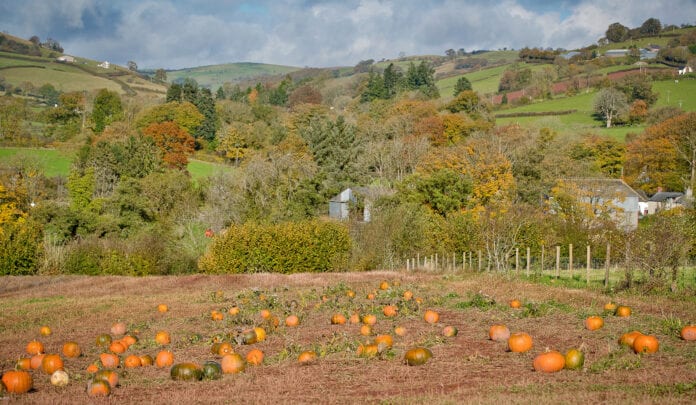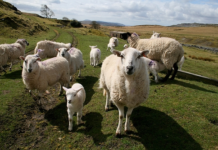
Confidence has returned to Wales’ pick-your-own (PYO) sector, with social media and the lure of nature driving growth.
Horticulture expert Chris Creed said there are many examples of very successful enterprises across Wales, from soft fruit and flower growers to large-scale pumpkin patches.
“Ten years ago, we thought traditional pick your own was dead in the water but it is now a very popular form of farm tourism,” he told people listening in to a recent Farming Connect webinar.
“People have an affinity with agriculture, they like a day out on the farm. It is about the farm experience; it is not necessarily production based.”
A first step for farmers contemplating entering this sector is to consider if it will interfere with the existing enterprises.
“It is no good starting a soft fruit pick your own business when June and July are the busiest months on your farm,” Mr Creed suggested.
Consider who is going to run it. “It does take up a lot of time,” said Mr Creed, but younger family members can take responsibility for different aspects of the enterprise, such as marketing by social media.
It is an advantage to be social media savvy to both promote the venture and to provide information on opening hours and product availability – in Wales there is training available through organisations like Farming Connect.
How a farm presents itself to the public is important – most farms are, or can be, attractive places to visit. “Visitors expect mud and animals but the farm needs to be tidy, first impressions are everything,” Mr Creed advised. However, farmers do not realise what a resource they have in the attraction of a normal farm environment.
Far from having a negative impact on PYO businesses, Covid restrictions has helped them to restructure to avoid situations where they are overwhelmed by visitors.
New booking systems allow visitor numbers to be controlled, to alleviate pressure on access and parking.
Proximity to urban areas and a good road network are no longer pre-requisites for a successful PYO, Mr Creed maintained.
“With sat nav people can find more remote places, some visitors see the journey to the farm as part of the day out, local doesn’t seem to be important any longer.”
The price point of the produce must be high enough to be profitable – the purpose of PYO is not to compete with supermarket prices.
“Visitors will think nothing of paying £2.50 for a pumpkin on farm even when they are 50p at the supermarket,” said Mr Creed.
“Families can spend £200 on a day out at a theme park, so spending £20 on a farm experience is good value. Providing tea, coffee and cake is welcome and can be served from a converted shipping container with a temporary marquee and picnic tables.”
But PYO won’t be for everyone, he added.
“People will eat a few strawberries and raspberries as they are picking, after all you are saving 40p-50p a kilogramme on your picking costs. If you can’t cope with that then it is not the job for you.”
But the return on investment is uncertain, it depends on many factors including how well the crops are grown.
Mr Creed advised farmers to think carefully before going down this route if resources are limited.
Growing under polytunnels is an expensive investment and requires planning permission – expect to spend £150,000/hectare.
But polytunnels offer a quick return on investment – they can be erected in March and fruit harvested three months later.
“You can be in profit by year two, even at this level of investment,” said Mr Creed.
But the fruit and vegetables must be grown well.
“Livestock farmers often struggle with plant husbandry but there are many sources of advice in Wales that can help with agronomy and pest and disease control,” said Mr Creed.
“You have to have the interest and the inclination, you can lose an entire crop in a day if the irrigation systems fails, you can’t fudge it.”
He said competition can often work in favour of a PYO as it can draw people to a particular area.
Pumpkin and sunflower patches are an “easy win”, Mr Creed suggested, as they require very little investment. “Sunflowers cost £100/hectare in seed costs and you can charge people to go into the field as a photo opportunity, and you can easily grow 2,000 pumpkins per acre.”
Cut flowers are also becoming very popular with both local florists and also for brides wishing to pick their own wedding flowers.
But parking needs to be carefully thought through, especially for pumpkins as people will visit in the autumn when conditions can be wet.
“Don’t think that people will be put off by the rain, people will visit and get out into the fields in the driving rain,” said Mr Creed.
Farming Connect, which is delivered by Menter a Busnes and Lantra, has received funding through the Welsh Government Rural Communities – Rural Development Programme 2014-2020, which is funded by the European Agricultural Fund for Rural Development and the Welsh Government.
Help keep news FREE for our readers
Supporting your local community newspaper/online news outlet is crucial now more than ever. If you believe in independent journalism, then consider making a valuable contribution by making a one-time or monthly donation. We operate in rural areas where providing unbiased news can be challenging. Read More About Supporting The West Wales Chronicle
























